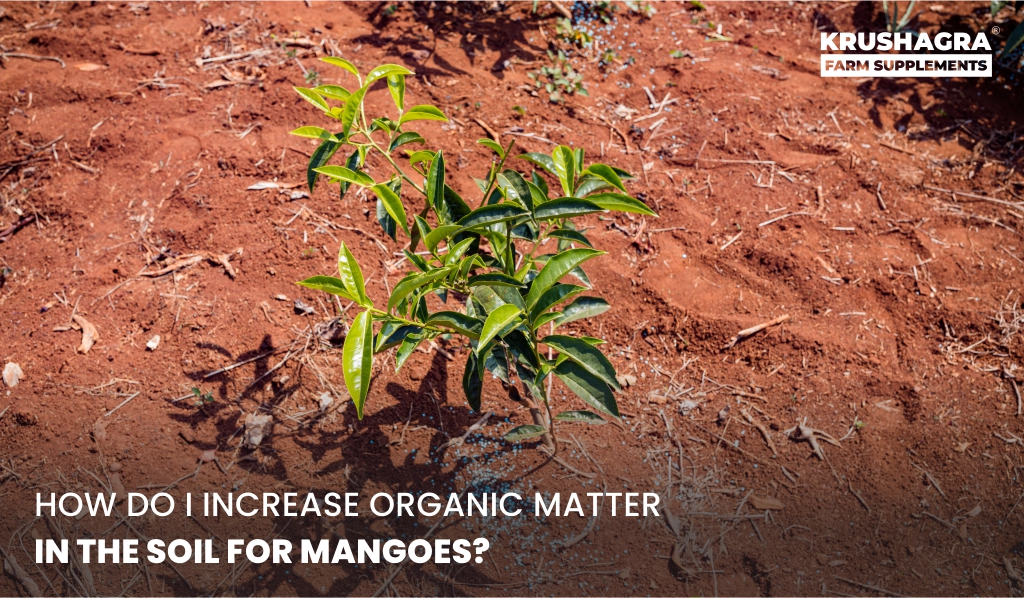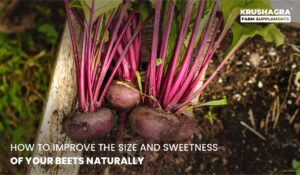Mangoes thrive in nutrient-rich soil with balanced organic matter. A well-maintained organic content not only supports healthy growth but also boosts fruit quality, resistance to pests, and overall yield.
This guide explores effective ways to enhance organic matter in the soil specifically for mango cultivation.
Understanding Organic Matter and Its Importance
Organic matter refers to decomposed plant and animal residues in the soil, which play a vital role in:
- Improving soil structure and aeration.
- Enhancing water retention and drainage.
- Increasing microbial activity for better nutrient cycling.
- Supporting root development and overall plant health.
For mango trees, which require deep, well-drained soil, maintaining sufficient organic matter is essential for sustaining long-term productivity.
Strategies to Increase Organic Matter in Soil for Mango Cultivation
1. Incorporating Organic Compost
Compost is one of the easiest and most effective ways to enhance soil organic matter. To achieve this:
- Create a Compost Pile: Use kitchen scraps, yard waste, and manure. Ensure proper aeration and moisture levels to promote decomposition.
- Apply Regularly: Spread a layer of compost around the base of mango trees, keeping it about 12-18 inches away from the trunk to avoid rot.
- Frequency: Add compost biannually, preferably during the pre-monsoon and post-harvest periods.
2. Using Farmyard Manure (FYM)
Farmyard manure, rich in nutrients and organic matter, is another excellent option.
- Source Quality Manure: Use well-decomposed cow, goat, or poultry manure to prevent nitrogen loss.
- Application: Incorporate 20-25 kg of manure per tree annually, mixing it lightly into the topsoil.
- Timing: Apply manure during the dormant season (late winter) for best results.
3. Planting Cover Crops
Cover crops improve soil fertility and organic matter content by adding biomass.
- Recommended Crops: Legumes like cowpeas, clover, and mung beans are ideal as they fix nitrogen in the soil.
- Management: Plant cover crops during the off-season and incorporate them into the soil before flowering for maximum benefit.
- Additional Benefit: They prevent soil erosion and suppress weeds.
4. Green Manuring
Green manuring involves growing and plowing under green crops to improve soil fertility.
- Best Green Manure Plants: Use crops like sesbania, sunn hemp, or dhaincha.
- Procedure: Sow green manure crops during monsoon and plow them back into the soil after 6-8 weeks.
- Advantages: This practice enhances soil texture and increases organic carbon content.
5. Mulching
Mulching helps retain moisture, regulate soil temperature, and decompose into organic matter.
- Materials: Use organic mulches like straw, dry leaves, wood chips, or coconut husks.
- Application: Spread a 2-4 inch thick mulch layer around the tree base, leaving a gap near the trunk to prevent fungal growth.
- Benefits: Mulching reduces evaporation, suppresses weeds, and provides a slow release of nutrients.
6. Vermicomposting
Vermicomposting involves using earthworms to decompose organic waste into nutrient-rich humus.
- Setup: Use bins with bedding material like coconut coir or shredded paper. Add organic kitchen waste and earthworms (e.g., Eisenia fetida).
- Harvest: After 2-3 months, collect the vermicompost and apply it around mango trees.
- Why It Works: Vermicompost enhances microbial activity and provides readily available nutrients.
7. Adding Biochar
Biochar, a carbon-rich material obtained by burning organic matter under low oxygen, improves soil organic content.
- Application: Mix biochar with compost or manure before applying to the soil.
- Benefits: It improves water retention, nutrient availability, and microbial habitat.
- Note: Ensure proper activation of biochar by soaking it in nutrient solutions before use.
8. Crop Residue Management
Instead of burning crop residues, incorporate them into the soil.
- Examples: Mango leaves, pruned branches, and other organic debris.
- Process: Chop residues into smaller pieces and mix them into the topsoil to decompose naturally.
- Effectiveness: This practice reduces waste and enriches soil organic matter.
Soil Management Practices to Sustain Organic Matter
1. Avoid Excessive Tillage
Excessive tilling can disrupt soil structure and reduce organic matter levels. Opt for minimal or no-till practices to preserve soil integrity and microbial activity.
2. Maintain Soil pH
Mangoes prefer a soil pH of 5.5 to 7.5. Use lime to raise pH or sulfur to lower it, ensuring optimal conditions for organic matter decomposition and nutrient availability.
3. Irrigation Management
Proper water management prevents leaching of nutrients and supports organic matter buildup.
- Drip Irrigation: Delivers water directly to the root zone, reducing water wastage and promoting microbial activity.
- Schedule: Avoid overwatering, as it can lead to root rot and nutrient loss.
4. Integrated Pest Management (IPM)
Use biological controls and organic pesticides to minimize chemical inputs, which can negatively affect soil microbes and organic matter levels.
Benefits of Increasing Organic Matter for Mango Trees
Enhancing organic matter in the soil offers numerous benefits:
- Improved Soil Structure: Loamy soil supports robust root growth and nutrient uptake.
- Enhanced Nutrient Availability: Organic matter acts as a reservoir of essential nutrients like nitrogen, phosphorus, and potassium.
- Better Water Retention: Organic-rich soil retains moisture longer, critical for mango trees during dry spells.
- Increased Microbial Activity: Beneficial microbes decompose organic material, releasing nutrients and improving soil health.
- Higher Yield and Quality: Healthy soil contributes to larger, sweeter mangoes with vibrant color.
Common Mistakes to Avoid
- Overuse of Chemical Fertilizers: Excessive use can degrade soil quality and harm beneficial microbes.
- Neglecting Soil Testing: Without soil analysis, amendments may not address the actual deficiencies.
- Improper Mulching: Using non-organic or excessively thick mulch layers can cause waterlogging or pest issues.
- Burning Organic Residues: This practice wastes valuable organic matter and releases harmful greenhouse gases.
Conclusion
Increasing organic matter in the soil is a way in sustainable agriculture to support healthy mango cultivation. By incorporating compost, manure, cover crops, and other organic practices, you can enhance soil fertility, structure, and microbial activity, resulting in thriving mango trees and bountiful harvests.
Regular soil testing and consistent management practices will ensure long-term success for your mango orchard.
FAQ’s
1. How often should I apply compost to mango trees?
Apply compost biannually, preferably before the monsoon season and after the harvest period, for optimal nutrient supplementation.
2. Can I use kitchen waste directly as fertilizer for mango trees?
It’s best to compost kitchen waste first. Directly applying it may attract pests or cause imbalances during decomposition.
3. Is biochar safe for all soil types?
Yes, biochar is generally safe, but it’s more effective when activated by soaking in nutrient-rich solutions before application.
4. What are the best mulches for mango orchards?
Organic mulches like straw, dry leaves, and wood chips work well as they decompose into organic matter over time.
5. How can I test the organic matter content in my soil?
You can conduct a soil test through agricultural extension services or use at-home soil testing kits for basic analysis.





